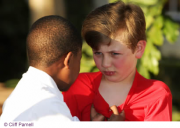 Compared to their victims, bullies experience a significantly higher risk of a wide range of health, safety and educational problems, according to research in the International Journal of Adolescent Medicine and Health.
Compared to their victims, bullies experience a significantly higher risk of a wide range of health, safety and educational problems, according to research in the International Journal of Adolescent Medicine and Health.
“We see that the [obvious] victims are not the only victims. The bullies are also victims of their own emotional problems,” said lead study author Jorge Srabstein, M.D., medical director of the Clinic for Health Problems Related to Bullying at Children’s National Medical Center in Washington, D.C. [continue reading…]

University of Alberta Educational Psychology PhD student Lindsey Leenaars has completed a study that assessed what types of high school students are being indirectly victimized. This includes being involved in emotionally damaging scenarios such as receiving hurtful anonymous notes, being socially excluded, or having rumours spread about them, including threats of physical harm. [continue reading…]
Published: March 26, 2008
Children who bully tend to have troubled relationships with parents and friends and may continue to bully throughout their teens if those problems are not addressed early, a new study by researchers at York University and Queen’s University shows.
“Focusing on the child alone is not enough. Bullying is a relationship problem. Children who bully are using power and aggression to control others,” says the study’s lead author Debra Pepler, a Distinguished Research Professor of Psychology at York University and Senior Associate Scientist at The Hospital for Sick Children. “We need to look at their relationships with their parents and with friends who may also bully. [continue reading…]
Published: March 25, 2008
Everyone has heard of the school bully, but just like the rest of us, bullies grow up and get jobs. A recent post on the New York Times blog generated over 300 posts
Link to this New York Times Video
 Compared to their victims, bullies experience a significantly higher risk of a wide range of health, safety and educational problems, according to research in the International Journal of Adolescent Medicine and Health.
Compared to their victims, bullies experience a significantly higher risk of a wide range of health, safety and educational problems, according to research in the International Journal of Adolescent Medicine and Health.
